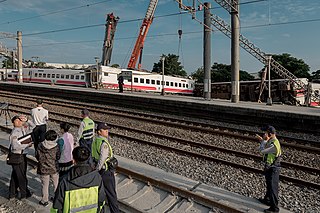Related Research Articles
The town of Morpeth in Northumberland, England, has what is reputed to be the tightest curve of any main railway line in Britain. The track turns approximately 98° from a northwesterly to an easterly direction immediately west of Morpeth Station on an otherwise fast section of the East Coast Main Line railway. This was a major factor in three serious derailments between 1969 and 1994. The curve has a permanent speed restriction of 50 miles per hour (80 km/h).
The Sutton Coldfield train crash took place at about 16:13 on 23 January 1955 in Sutton Coldfield, Warwickshire, when an express passenger train traveling from York to Bristol, derailed due to excessive speed on a sharp curve.

Awash Subah is a market town in central Ethiopia. Located in Administrative Zone 3 of the Afar Region, above a gorge on the Awash River, after which the town is named, the town lies on the Addis Ababa–Djibouti Railway, which crosses the gorge by a bridge there. It is the largest settlement in Awash Fentale woreda.
There have been a number of train accidents on the railway network of Victoria, Australia. Some of these are listed below.
The railways of New South Wales, Australia have had many incidents and accidents since their formation in 1831. There are close to 1000 names associated with rail-related deaths in NSW on the walls of the Australian Railway Monument in Werris Creek. Those killed were all employees of various NSW railways. The details below include deaths of employees and the general public.
The Yanga derailment occurred on 21 June 2010 when a train traveling between Brazzaville and Pointe Noire in the Republic of the Congo was derailed and plunged into a ravine. At least 60 people were initially reported to have been killed and hundreds disappeared with the death toll expected to rise further. The death toll had risen to 76 people and the injury toll had risen to 745 by 23 June 2010.
On 21 October 2016, a Camrail inter-city passenger train travelling from Cameroon's capital, Yaoundé, to its largest city, Douala, derailed in Eséka, Centre Region. By 30 October 2016, the official number of casualties had reached 79 dead, with 550 injured. It was the deadliest rail crash on the African continent since the August 2007 Benaleka train accident.

On 21 October 2018, a passenger train derailed in Yilan County, Taiwan, killing 18 people and injuring 187. At the time, it was Taiwan's deadliest rail accident since a collision near Miaoli in 1991 that killed 30 people.
References
- 1 2 "A passenger train traveling through Ethiopia hurtled off the..." United Press International. January 14, 1985.
- 1 2 3 4 May, Clifford D. (January 15, 1985). "Ethiopian train falls off bridge; 392 are killed". The New York Times .
- 1 2 3 4 "Rail-crash toll may pass 400 in Ethiopia". Chicago Tribune . January 15, 1985. p. 1.
- 1 2 "Train Derails in Ethiopia, 418 Die : 559 Injured; Officials Fear Wreck May Slow Famine Relief". Los Angeles Times . Associated Press. January 14, 1985.
- 1 2 "The world's worst train disasters". Railway Technology.com. January 2, 2014.
- ↑ "428 dead". Daily News . Bowling Green, Kentucky. Associated Press. January 17, 1985. p. 8A.
- 1 2 "Express train derails in Ethiopia, killing an estimated 400 people". South African History Online. January 3, 2012.
- ↑ "Driver blamed for train crash". Ottawa Citizen . Canadian Press. January 15, 1985. p. A7.